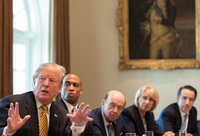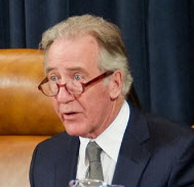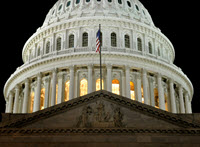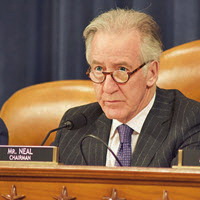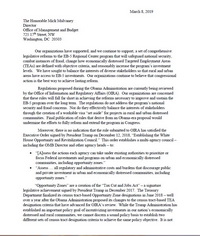The Treasury Department on Wednesday released a highly-anticipated, second set of Opportunity Zone (OZ) regulations that seek to provide certainty to potential OZ investors and drive economic development in economically distressed communities nationwide. (reference: 169-page Treasury regulations and IRS news release, April 17)
 |
|
President Donald Trump with Scott Turner, executive director of the White House Opportunity and Revitalization Council, at the April 17 Opportunity Zone Conference with state, local, tribal and community leaders. (Official White House Photo by Shealah Craighead) |
- A White House Opportunity Zones event on Wednesday featured President Trump, Treasury Secretary Steven Mnuchin and officials from local governments around the country. (White House Remarks and Video, April 17)
- The Treasury Department designated more than 8,700 low-income census tracts as Qualified Opportunity Zones last June. (IRS Notice 2018-48). Treasury estimates that Opportunity Zones will boost investment in these targeted areas by $100 billion. According to White House Chief Economist Kevin Hassett (citing Zillow data), property values in Opportunity Zones have appreciated by about 20 percent since zone designations were made in early 2018.
- Roundtable President and CEO Jeffrey DeBoer said, “We are pleased that these proposed regulations provide answers to many key structural and operational questions that have concerned potential opportunity zone investors, developers, and business owners. The opportunity zone program, designed to stimulate investment in economically struggling communities nationwide, has tremendous potential. We look forward to continuing to work with policymakers to reduce unnecessary, counterproductive aspects of the new law.”
The Roundtable previously submitted two comment letters to policymakers on Opportunity Zones, one in June 2018 and one in December 2018. (Roundtable Weekly: Oct. 19, and Dec. 21). The rules issued this week expanded on the previously proposed regulations and address a variety of OZ investment issues. Positive developments in the newly proposed regulations include the following:
 |
|
The 169-page Treasury regulations and IRS news release, April 17 |
- Opportunity Funds that own more than one property can sell assets individually after a 10-year holding period and fund investors can exclude the gain, without a requirement that the fund investor sell his or her interest in the fund. In addition, the regulations clarify that multi-asset Opportunity Funds that choose to set up separate funds for individual assets can reduce the administrative burden on their investors through the use of a “feeder” fund that aggregates the fund interests;
- Opportunity Funds can make nontaxable, debt-financed distributions to fund investors during the 10-year holding period, provided they comply with “disguised sale” rules that limit distributions made during the first 2 years;
- Land (improved and unimproved) is qualified opportunity zone business property provided it is used in an active trade or business, and it does not have to meet the “original use” or “substantial improvement” requirements that apply to structures;
- The working capital safe harbor, which provides up to 31-months for Opportunity Funds to deploy capital, is further liberalized. Specifically, the regulations clarify that: (1) subsequent contributions of capital to the same Opportunity Fund are subject to a new 31-month period, and (2) the 31-month period is extended if the delay is due to waiting for government action or approval;
- Leased property, including property leased by an Opportunity Fund from a related property, can qualify as opportunity zone business property if certain requirements are met. This clarification in particular should help existing owners of property in Opportunity Zones participate in the tax incentives without having to sell or dispose of their ownership interest;
 |
|
Roundtable President and CEO Jeffrey DeBoer said, “We are pleased that these proposed regulations provide answers to many key structural and operational questions that have concerned potential opportunity zone investors, developers, and business owners.” |
- Real estate that straddles an Opportunity Zone border can qualify as opportunity zone business property as long as the portion of the property that is inside the zone is substantial relative to the total property;
- While the sale of an asset during the 10-year holding period is generally a taxable event for the Opportunity Fund investors, the regulations infer that a fund could do a like-kind exchange and as long as the replacement property is qualified opportunity zone business property, the gain would be deferred for the investors;
- Lastly, the regulations include a number of changes that aim to facilitate investment in operating businesses, which should increase tenant demand for commercial real estate located in Opportunity Zones.
The IRS has scheduled a public hearing on the second set of proposed rules for July 9, 2019. Comments are due 60 days after the proposed rules are published in the Federal Register. A third set of proposed guidelines is expected on Opportunity Fund’s reporting requirements to measure the effectiveness of the program.
The OZ program’s goals and incentives were the focus of a Jan. 29 discussion during The Real Estate Roundtable’s State of the Industry Meeting, which featured Sen. Scott and Roundtable member Geordy Johnson (CEO, Johnson Development Associates, Inc.). (Roundtable Weekly, Feb. 15)
The Roundtable’s Tax Policy Advisory Committee (TPAC) plans to continue its work with policymakers on the OZ program and regulations affecting Qualified Opportunity Funds.
